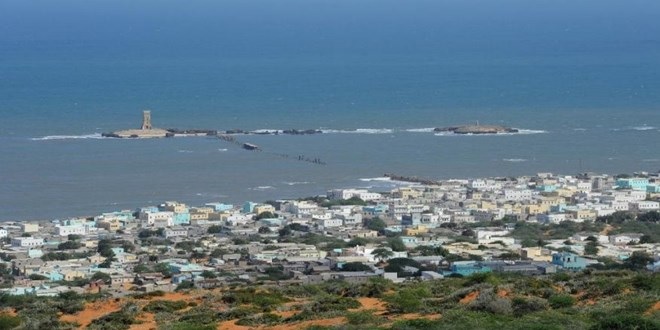
Over the past couple of weeks, outbreaks of violence and clan conflict have escalated across Somalia from north to south and erupted in areas hitherto spared from such violence in recent years. The violence in Barawe, the official capital of Southwest State, has exposed the critical flaws in federal leadership in the Lower Shabelle region.
On June 12, Somali National Army troops stationed in Barawe reportedly attacked Southwest State forces tasked with securing the regional presidential palace and then forcibly took over the city’s airport. According to local sources, the army troops called the African troops of the ATMIS for assistance after suffering a bitter setback.
A ceasefire has been established but the exchanges of fire left dozen dead and as much wounded. Until now the two sides are holed up in their defense and the situation is still tense. Yet, local mediators succeeded yesterday in convincing the army to reopen the airport while investigations and talks are underway to defuse the situation.
Between indiscipline and land claim
Until then, it is not known what really prompted these regular army troops to turn their guns on the Darwish unit, these regional forces with whom they collaborated in the fight against Al-Shabab, but speculations are rife.
The commander of the army contingent involved in the firefight said in an interview that a Southwest State Darwish soldier refused to pay for khat he bought from a female army soldier who sells the drug to her unit.
His brother attacked the Darwish soldier which implicated his colleagues. Then the situation escalated when Darwish’s unit commander machine-gunned an army guard.
In short, even if the Commander’s story seems implausible, it clearly reveals the indiscipline and weakened state of his troops. Khat is a highly addictive drug from Ethiopia and Kenya, which the Somali president and his entourage have a monopoly on importing. Prime minister Hamze Barre recently blamed the use of khat by some policemen for the indiscriminate killings of civilians in Mogadishu.
These soldiers would all strangely come from the president’s clan. Some made warlike messages with a tribal flavor. They thundered that Barawe and its region, Lower Shabelle, would belong to their clan and their community had liberated it some twenty years ago.
Coincidentally the attack happened just days after Southwest State President Abdi-Aziz Laftagareen and Somalia’s Parliament Speaker Adan Madobe laid a brick for the future port of Barawe. The construction shows that the regional administration based in Baidoa and led by Laftagareen is investing time and money to develop the city. This news was badly received by those who claim Barawe for their own clan.
Solving the conflict
President Laftagareen, upset about the unwarranted offensive on his compound, called President Hassan Sheikh Mahamoud which proposed to set up a fact-finding mission and brought the culprits to an army court. But Laftagareen wanted nothing short than the federal troops out of his region.
The following day, on June 17, a motion was presented to the Federal Parliament by members of the Southwest. They wanted an investigation to be opened and those responsible for the violence to be brought to justice. The assembly decided to create a 10-member committee to investigate the violence of the Barawe and report to them.
Just two days later, cracks appeared in the committee after two MPs whose constituencies are in the Southwest resigned over objections to the way a chair had been chosen in their absence. The chairman is from the same clan that claims Barawe and its region and whose soldiers attacked the presidential compound in Barawe. Resigning MPs said they wanted a neutral party to lead the committee, not someone from warring clans.
Also, high ranking officers and officials from the federal defense ministry and the Southwest State were dispatched by their respective government and have yet to share their findings and propose a way out of the crisis.
Barawe, a battleground against its will
The historic town of Barawe located on the Indian Ocean coast is generally quiet and its people cosmopolitan, peaceful and culturally distinct from the rest of Somalia. Its continental shelf is teeming with offshore oil and has been coveted by American and British oil companies.
The city bore the brunt of General Aidid’s rebel troops who perpetrated massacres in the region in the 1990s. Today, his sub-region is infested with nihilistic Al-Shabab militants who have made road transit between the city and the neighboring bigger city of Merca a perilous journey.
In 2014, with the help of the African Mission in Somalia (AMISOM), the National Army snatched Barawe from Al-Shabab. Then, Ugandan troops operating under AMISOM, now ATMIS, established the Forward Operating Base of Marianguwaay, halfway between Barawe and Merca. In 2021, the African troops transferred the FOB to the 6th Division of Somali army unit who is now caught up in Barawe violence.
In recent days, a Somalia divided by ill-conceived federal politics has been embroiled in widespread clan conflicts from Las Anod to Gedo. Mogadishu, the national capital itself, is already recovering from the terrorist attack on Pearl Beach Hotel in Lido Beach, which left around 6 people dead and injured 10.
Since President Hassan Sheikh Mahamoud took power a year ago with the help of the Americans, the British and the United Arab Emirates, Somalia has returned to the clan violence of early 1990’s, state corruption and the fragmentation of the army has contributed to inflaming these conflicts.
